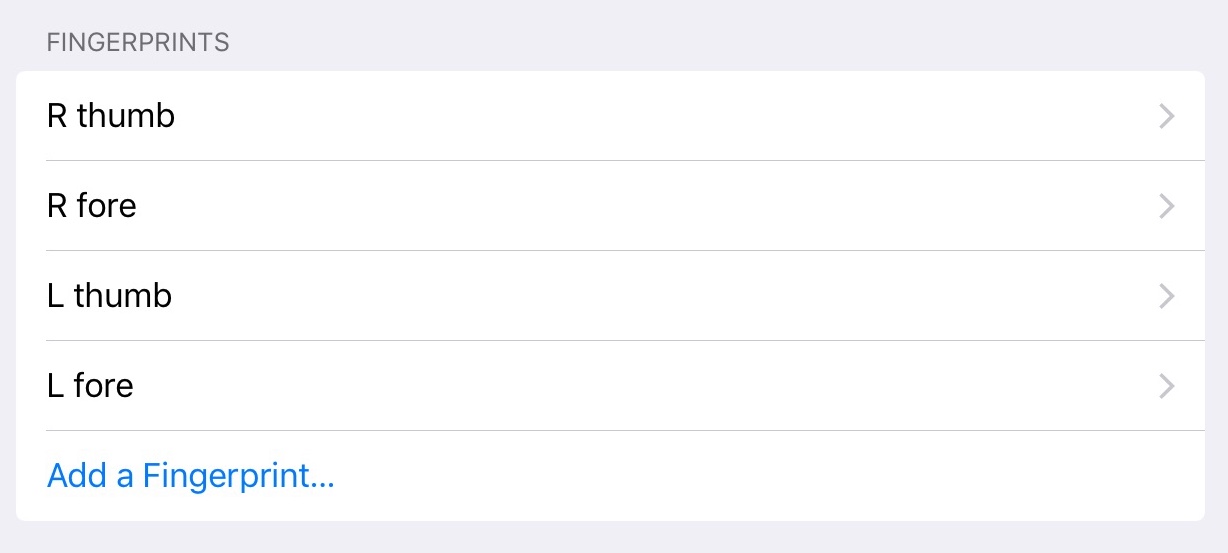When you’re setting up your fingerprints for Touch ID, take the time after registering each one to go in and give it a name. Then if you find one finger becoming unreliable, you know which one to delete and reprogram.

When you’re setting up your fingerprints for Touch ID, take the time after registering each one to go in and give it a name. Then if you find one finger becoming unreliable, you know which one to delete and reprogram.

Here’s my thought for the year:
It’s much more important to read things with which you disagree than to read things with which you agree.
 If, like me, you have been pondering linear algebra on a Christmas afternoon (and, frankly, who hasn’t?), or if you know anybody who is learning it for the first time, then I highly recommend Grant Sanderson’s YouTube channel, 3Blue1Brown where he makes all kinds of mathematical ideas easier to understand through some clever visualisations.
If, like me, you have been pondering linear algebra on a Christmas afternoon (and, frankly, who hasn’t?), or if you know anybody who is learning it for the first time, then I highly recommend Grant Sanderson’s YouTube channel, 3Blue1Brown where he makes all kinds of mathematical ideas easier to understand through some clever visualisations.
In particular, his Essence of linear algebra course is a wonderful presentation of the basics. Do you have vague memories of matrix multiplication and of phrases like ‘determinant’ and ‘eigenvector’ but have no idea why you learned them or what they did? Then this is the resource for you. Not only is it good revision, but it explains them in a different way from the way you might have learned them originally, which can help you get a better understanding than you had before.
Oh, and if linear algebra isn’t your idea of a fun way to spend Christmas, don’t worry. There’s Essence of Calculus as well.
There’s a nice post about the coffee pot webcam on the Gonville & Caius College website this morning. Thanks, Lucy!
I think this is wonderful. Today I got to play with Gareth Bailey’s Space Invaders game – a quick hack, he claims, which he put together yesterday.
This uses an oscilloscope as an X-Y plotter to draw the graphics, harking back to the earliest days of computer displays. But historically, displays like this would usually have been driven by a mainframe, where as Gareth’s is driven by a Raspberry Pi.
And where do you get a couple of nice analog outputs from a Raspberry Pi? Why, from the left and right channels of the audio, of course….
Apologies for the quality of the video, but I thought this was worth capturing despite the challenging environment!
Last night we went into London because the kind people at the Lovie Awards, the European branch of the (rather better-known) Webby Awards, had been good enough to give me an award, mostly for the work that friends and I had done in creating the first webcam.
I was a bit embarrassed about this, partly because I didn’t think I deserved it, and partly because of the name, but I got over the latter, at least, when I discovered that it’s in honour of Ada Lovelace.
Anyway, the tradition is that you have to give a little speech containing the word ‘Love’. The other tradition, which nobody told me, is that the speech should be about 30 seconds, which is why I look a bit more flustered than usual here! I was trying, not very successfully, to edit my speech on the fly. But I got away with it because mine was the last award of the evening.
It was a great and responsive audience, which, sadly, you can’t hear on this video.
Sean Riley creates the Computerphile YouTube channel, which has clocked up nearly a million subscribers, and produces some great stuff, especially for the geeks among us.
I had fun talking to him about the early days of the Trojan Room Coffee Pot.
 This is a brilliant idea. Take the world and divide it into 3m squares. Then, given a modest vocabulary, you can label each square using just three words.
This is a brilliant idea. Take the world and divide it into 3m squares. Then, given a modest vocabulary, you can label each square using just three words.
For example, I work half-time at ‘faced.ears.sport’, which you can find by typing it into the What3Words map at map.what3words.com, or you can turn it into a handy URL:
http://w3w.co/faced.ears.sport
Isn’t that much easier than saying ‘The south west corner of the William Gates building at 15 J J Thomson Avenue, Cambridge, CB3 9JW, UK’? Or ‘52.210577 N 0.092133 E’?
It’s even more valuable, though, in countries where addressing schemes are less well established or non-existent.
Now, it has a couple of limitations that I can see. First, you do need to be fairly precise about those words if, say, you’re reading them over the phone. If, instead of ‘faced.ears.sport’, you went to ‘face.ears.sport’, you’d find yourself in a little residential street in Montana, which would be delightful, but you wouldn’t find me there on a typical work day. ‘faced.ears.port’ is in Louisville, Kentucky. However, the fact that they’re so spread out probably makes such errors less likely to go undetected – this is deliberate.
The second limitation is that this is a commercial operation and not an open standard, which is a pity in some ways, but understandable. It’s free for individuals to use – there’s a free iOS and Android app, for example – and the pricing page contains this assertion:
If we, what3words ltd, are ever unable to maintain the what3words technology or make arrangements for it to be maintained by a third-party (with that third-party being willing to make this same commitment), then we will release our source code into the public domain. We will do this in such a way and with suitable licences and documentation to ensure that any and all users of what3words, whether they are individuals, businesses, charitable organisations, aid agencies, governments or anyone else can continue to rely on the what3words system.
I think it’s a brilliantly simple idea. The concept has been used in other situations (passwords, PIN numbers etc), but works really well here.
Spend 10 minutes with the brilliant Victor Borge.
Elon Musk’s latest rocket concept – the ‘BFR’ – would take you anywhere in the world in under an hour, and most destinations in about 30 mins.
Oh, that’s plus, presumably, three hours for check-in, security and passport control. And another for baggage collection and immigration when you get there…
However, if he can fix that – i.e. sort out the airports too – then going to Mars should be easy in comparison…
© Copyright Quentin Stafford-Fraser
Recent Comments